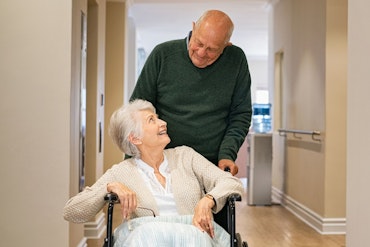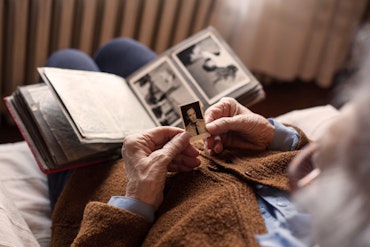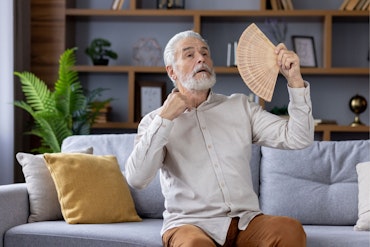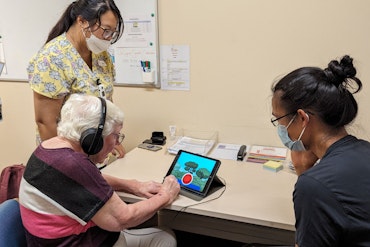Grim new findings about isolation in older men
This International Men’s Health Week also coincides with Loneliness Awareness Week making the timing of the ‘Age Well, Together’ campaign even more significant.

As International Men’s Health Week (June 12 – 18) focuses on the physical wellbeing of men around the world, the neglected mental health issues plaguing society have been bubbling to the surface. (Image: supplied)
Key points:
- Leading care provider, Widdon, is promoting the ‘Age Well, Together’ campaign to address the mental health implications of loneliness in older men
- The campaign pushes for men to explore their passions and hobbies through programs such as Whiddon Men’s Sheds
- According to Mental Health First Aid Australia, as many as one in four Australian men will experience a mental illness in their lifetime
To ensure that older men remain engaged in their communities and in tune with their hobbies, Whiddon’s ‘Age Well, Together’ campaign during International Men’s Health Week is encouraging ageing blokes to pick up the drill, swing their golf club and sizzle a snag on the barbie together.
The campaign launched on June 14, with Whiddon residents, Men’s Shed volunteers, Whiddon staff and local business supporters gathering together to celebrate the joys of mateship. To mark the occasion, a luncheon was put together at Whiddon Easton Park Men’s Shed, with Chief Executive Officer (CEO) Chris Mamarelis hosting the event.
Whiddon’s CEO says the impact of the men’s shed goes above and beyond the event itself, instead, he says men’s mental health should be guided by the conversations people share, discourse surrounding their feelings and having each others’ backs.
“Today is about getting us all together, celebrating men and the work Whiddon do [sic] to support our residents. Sometimes we lose sight of supporting each other, and we’re trying to shine a light on the men in aged care, the men in our community, to create more meaningful connections and meet the needs of our men,” says Mr Mamarelis.
Along with the ‘Age Well, Together’ campaign, new findings were released to solidify the need for ongoing support. The findings of Whiddon’s internal qualitative ‘Lifetime Wave Four’ report highlight the importance of social connection and the impact of gender on resident well-being.
- Findings from Whiddon’s research show that men had a higher probability of negative outcomes, such as social isolation
- Whiddon’s study also reveals men were more likely to avoid joining in on available social activities
- Additionally, Australian Institute of Health and Welfare data highlights Australian men are statistically more likely to have a lower life expectancy, be overweight and experience higher rates of a range of chronic diseases in comparison to women
Easton Park Men’s Shed Volunteer, Bill Dickinson, says that the activities on offer through the Men’s Shed play a significant role in furthering inclusion and improving the mental well-being of older fellas.
“I think the activities here are important, because it’s not good to see the guys sitting in their rooms all day watching TV. It gets them out and about — chatting to people,” he says.
“I encourage a few of my mates to come down and enjoy a few hours out of the house. Having a hobby is important because it gives people in older lives purpose and meaning in life. I’ve seen a few of the guys lose their wives and they feel they have nothing to live for. That just isn’t the case, we’re all here to support them.”
The social media-led campaign is calling on older men both inside and outside of the Whiddon community to discover new ways to stay connected, try new hobbies or rediscover old ones to help improve their physical and mental health.
“At Whiddon, we are proud to launch the ‘Age Well, Together’ campaign and be a part of the movement to reduce the stigma around loneliness by encouraging men to talk more openly about their feelings and find ways to become more involved in their communities,” says Karn Nelson, Whiddon Executive General Manager of Research, Positive Ageing and Board Member of Ending Loneliness Together.
“Loneliness has a negative impact on everyone’s health, both physical and mental. Men, in particular, acknowledge that they are more socially isolated as they get older, and this can have a significant impact on their quality of life. There are ways to combat this by staying interested and engaged in interests and hobbies as you age,” adds Ms Nelson.
As a regional and rural care provider, Whiddon says they understand how these issues are more difficult for those living in rural areas and the company works passionately to connect, inspire, and enrich the lives of those in their care. Whiddon runs 11 Men’s Sheds and groups across metro, regional and rural areas of New South Wales and South East Queensland. In uniting volunteers and members of the Whiddon community, the Men’s Shed program provides meaningful activity through hands-on projects to support connection and social networks.
“The old adage that men don’t bond face-to-face, they bond shoulder-to-shoulder is true. Our male residents and clients tell us that they find it harder to make new, meaningful social connections with other men as they age. Working together on a project, such as those in our Men’s Sheds gives them a sense of purpose and belonging,” says Karn.
For more information on ‘Age Well, Together’ and Whiddon’s commitment to healthy ageing please visit https://www.whiddon.com.au/.























